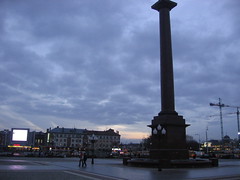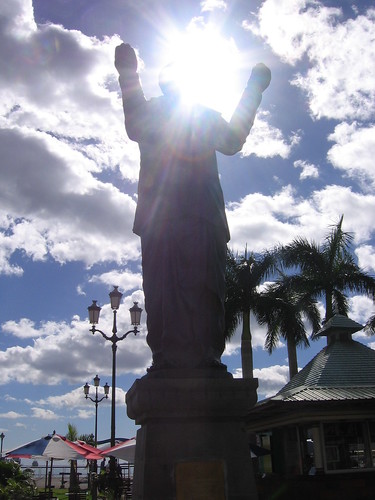Kaliningrad: skies and limits
I was fortunate enough to be invited to visit the Russian exclave of Kaliningrad last week. The collapse of the USSR was particularly troublesome for the province, which, found itself cut off from 'big Russia' in 1992. Sandwiched between Lithuania and Poland, Kaliningrad, which had been a heavily militarized region that was closed to foreigners during the Soviet era, suffered extreme economic hardship as many businesses went to the wall. Serious outbreaks of HIV/AIDS and TB and the sense that Kaliningrad had been forgotten added to the gloom.
Today, Russia's 'extreme west' remains something of an enigma, an anachronism and (for the EU) a problem, but it is also beginning to be a place of opportunity. Kaliningrad's status as a Special Economic Zone (SEZ) with more favourable tax and investment rules than other parts of Russia, has led to many manufacturing businesses shifting production there. The BBC's Laura Sheeter provides some details here.
Kaliningrad airport may be more reminiscent of those serving small communities in Finland and Sweden than a major international hub (I arrived by Fokker twin-prop from Copenhagen), but a trip to Victory Square in the centre of the capital indicates the revival of the province's fortunes. As well as the cranes on the skyline (see photo), a new shopping centre has sprung up and a new cathedral - Christ the Saviour - was completed in September.
Aside from Victory Square, Kaliningrad's other major tourist attraction is the Koenigsberger Dom, a 14th century cathedral that houses the tomb of Immanuel Kant. The celebrated philosopher spent almost his entire life in the East Prussian city of Koenigsberg. When the Red Army rolled into the ruins of this easternmost German outpost in 1945, it set about expelling the population. Over the next 40-odd years, many physical reminders of Kaliningrad's German heritage were also removed. Thankfully many still remain (the architecture is a curious mix of modern international, Soviet and Prussian).
One of the oldest buildings in the city, a former German fort, is now a restaurant. Both food (fish, red caviar and eel) and vodka were very good. According to my host, Kaliningrad is one of three regions in Russia where the vodka is particularly notable (the others being Baikal/Irkutsk and Vladivostock). He was somewhat disparaging of the vodka in Moscow and St. Petersburg.
Driving two hours east to the town of Neman I was surprised at how good the road was. Having found the roads of western Poland very hard going during a visit four years ago, I was expecting those in Kaliningrad to be as bad, if not worse. In fact, once you get past the checkpoint set up to prevent Chechen terror attacks on the city of Kaliningrad, the road surface of the main highway is fine (on a par with eastern Germany). The road even turns into a dual carriageway in places.
The roads in Neman were a little more rough and ready, but the town of 12,000 people, which had an unemployment rate of 97% in the late 1990s, is back on its feet now, with a recently built hotel and bank, and a multimillion dollar investment program at Neman Pulp and Paper Mill, the town's main employer. The mill was brought out of bankruptcy at the turn of the decade by a company from St. Petersburg.
Neman backs on to the River Neman, the border with Lithuania. While walking close to the river an alarm sounded. "That means that someone has crossed the border illegally", my guide and interpreter explained. Although smuggling still goes on, the smugglers face a much tougher task since the river became the frontier with the EU, as Laura Sheeter notes.
Crossing the border is also a problem for legitimate trade and travel, however. One local businessman explained to me that it once took him two hours to get into Lithuania via the road bridge at Sovetsk (10 km from Neman). Crossing the land border between Russia and Finland takes 15 minutes. Shipments of goods can be held up at customs for one to two days. A transit tax applicable to some shipments passing through Lithuania can also offset the benefits of producing in the SEZ. This additional tax burden is one reason why the dream of turning Kaliningrad into 'the Hong Kong of Europe' will not be easy to realize. But for the Kaliningraders with new jobs, cars, shops and restaurants to appreciate, life is already a whole lot better now than it was in the 90s.
For a selection of photos from Kaliningrad Oblast, click here.
Today, Russia's 'extreme west' remains something of an enigma, an anachronism and (for the EU) a problem, but it is also beginning to be a place of opportunity. Kaliningrad's status as a Special Economic Zone (SEZ) with more favourable tax and investment rules than other parts of Russia, has led to many manufacturing businesses shifting production there. The BBC's Laura Sheeter provides some details here.
Kaliningrad airport may be more reminiscent of those serving small communities in Finland and Sweden than a major international hub (I arrived by Fokker twin-prop from Copenhagen), but a trip to Victory Square in the centre of the capital indicates the revival of the province's fortunes. As well as the cranes on the skyline (see photo), a new shopping centre has sprung up and a new cathedral - Christ the Saviour - was completed in September.
Aside from Victory Square, Kaliningrad's other major tourist attraction is the Koenigsberger Dom, a 14th century cathedral that houses the tomb of Immanuel Kant. The celebrated philosopher spent almost his entire life in the East Prussian city of Koenigsberg. When the Red Army rolled into the ruins of this easternmost German outpost in 1945, it set about expelling the population. Over the next 40-odd years, many physical reminders of Kaliningrad's German heritage were also removed. Thankfully many still remain (the architecture is a curious mix of modern international, Soviet and Prussian).
One of the oldest buildings in the city, a former German fort, is now a restaurant. Both food (fish, red caviar and eel) and vodka were very good. According to my host, Kaliningrad is one of three regions in Russia where the vodka is particularly notable (the others being Baikal/Irkutsk and Vladivostock). He was somewhat disparaging of the vodka in Moscow and St. Petersburg.
Driving two hours east to the town of Neman I was surprised at how good the road was. Having found the roads of western Poland very hard going during a visit four years ago, I was expecting those in Kaliningrad to be as bad, if not worse. In fact, once you get past the checkpoint set up to prevent Chechen terror attacks on the city of Kaliningrad, the road surface of the main highway is fine (on a par with eastern Germany). The road even turns into a dual carriageway in places.
The roads in Neman were a little more rough and ready, but the town of 12,000 people, which had an unemployment rate of 97% in the late 1990s, is back on its feet now, with a recently built hotel and bank, and a multimillion dollar investment program at Neman Pulp and Paper Mill, the town's main employer. The mill was brought out of bankruptcy at the turn of the decade by a company from St. Petersburg.
Neman backs on to the River Neman, the border with Lithuania. While walking close to the river an alarm sounded. "That means that someone has crossed the border illegally", my guide and interpreter explained. Although smuggling still goes on, the smugglers face a much tougher task since the river became the frontier with the EU, as Laura Sheeter notes.
Crossing the border is also a problem for legitimate trade and travel, however. One local businessman explained to me that it once took him two hours to get into Lithuania via the road bridge at Sovetsk (10 km from Neman). Crossing the land border between Russia and Finland takes 15 minutes. Shipments of goods can be held up at customs for one to two days. A transit tax applicable to some shipments passing through Lithuania can also offset the benefits of producing in the SEZ. This additional tax burden is one reason why the dream of turning Kaliningrad into 'the Hong Kong of Europe' will not be easy to realize. But for the Kaliningraders with new jobs, cars, shops and restaurants to appreciate, life is already a whole lot better now than it was in the 90s.
For a selection of photos from Kaliningrad Oblast, click here.
Labels: On the road


1 Comments:
The soundtrack to the trip was a dollop of western pop and rock from the 70s and 80s mixed with Russian rock and pop of today, courtesy of local station, Radio Monte Carlo. Hearing Carl Douglas's 'Kung Fu Fighting' while been driven through Sovetsk was one of those gloriously incongruous moments that lives long in the memory. The most memorable of the Russian hits was a track called 'Malinki' by Diskoteka Avariya and Zhanna Friske. Imagine a Russian Remy and Sven jamming with Bandolero, MC Miker G and Dr. B switching off on those Euronaff couplets. Add a healthy dose of 'hands in the air' rave music and you pretty much have the picture. Sovetsk, or Tilsit in its East Prussian incarnation, is a town renowned for its cheese. Well, you don't get much better cheese than this track. For more info, go to: http://clubcontact.blogspot.com/2006/09/diskoteka-avariya-may-look-like-my.html
Post a Comment
<< Home